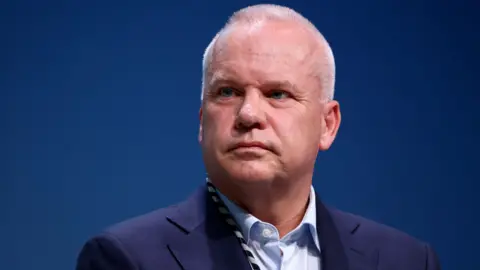BBC Business editor
 Getty Images
Getty ImagesNorwegian energy giant Equinor is halving investment in renewable energy over the next two years while increasing oil and gas production.
Chief executive Anders Opedal said that the transition to lower carbon energy was moving slower than expected, costs had increased, and customers were reluctant to commit to long term contracts.
Mr Opedal told the BBC he was confident that Rosebank – a giant new oil field in the North Sea – would go ahead, despite a recent court ruling that consent had been awarded unlawfully.
He also warned that gas prices could rise next winter as European gas storage levels were lower now than this time last year.
“We are scaling down our investments in renewables and low carbon solutions because we don’t see the necessary profitability in the future,” Mr Opedal said.
It will cut investments in renewables to $5bn over the next two years, down from about $10bn.
It will also drop a target to spend half of its fixed assets budget on renewables and low carbon products by 2030.
By contrast, Equinor will be increasing oil and gas production by 10% over the next two years.
Rosebank ‘not straightforward’
The controversial Rosebank oil field is thought to hold 500 million barrels of oil.
A Scottish court recently ruled that consent had been granted unlawfully as the application did not account for the full environmental impact of the project.
Many within the UK government – including the energy secretary Ed Miliband – are opposed to it.
Mr Opedal acknowledged it was a divisive issue but insisted it was good for the UK economy.
“This is an important project for us. It provides local jobs in Scotland, local jobs in the UK, so we think this project will move forward,” he said. “We think that Western Europe and the UK should produce the oil and gas it uses instead of being dependent on other countries outside Europe.”
Climate campaigners and the oil industry both claimed victory at the Supreme Court ruling as although the consent was revoked, the court allowed preparatory work to continue on Rosebank while new consents are sought.
The government said it has “already consulted” on emissions from burning extracted oil and gas, and will incorporate the results of the consultation when making revisions to environmental guidance.
“Our priority is to deliver a fair, orderly and prosperous transition in the North Sea in line with our climate and legal obligations, which drives towards our clean energy future of energy security, lower bills, and good, long-term jobs,” the spokesperson added.
Tessa Khan, from the environmental campaign group Uplift which, along with Greenpeace, brought judicial reviews to stop the development of Rosebank, said Equinor was getting ahead of itself.
“I think it’s in the industry’s interest to make it sound like it’s a tick box exercise to get Rosebank over the line,” she said.
“There is a regulatory process that needs to be satisfied, and there are very strong public interest arguments against developing Rosebank, so we don’t think it will be a straightforward decision at all.”
She added that new oil and gas fields will not bring down UK bills or improve UK energy security, as renewables would, because the oil is drilled and sold for export.
“I think we should be honest about whether or not oil and gas companies are good faith partners in the energy transition and interested in lowering people’s energy bills. I think the answer now is very clearly ‘no’,” she said.
Trump stance ‘positive’
Equinor follows other energy companies in reducing investment in renewables. Shell and BP have both scaled back their future plans.
Mr Opedal appeared to welcome Donald Trump’s invitation to the industry to “drill, baby, drill” but said energy prices, not the US president, would dictate future exploration and production.
“When I hear ‘drill, baby, drill’, I see that as a positive sentiment to the oil and gas business but I think companies will always decide on drilling programs based on price signals,” said Mr Opedal.
“If prices go down, less wells will be drilled, if it goes up, more will be drilled.”
When asked how this was compatible with his target to make Equinor net zero by 2050, he conceded that drilling more now would make it harder in later years.
Mr Opedal also warned that low levels of gas storage in Europe as it exits this winter could mean higher prices next year.
“Gas storage levels will be lower this spring, meaning that Europe will need to fill up larger amounts of gas to keep it at the same level,” Mr Opedal added. “The increase in underlying demand for gas from China means more competition for energy which has the potential to increase prices.”
Source link
